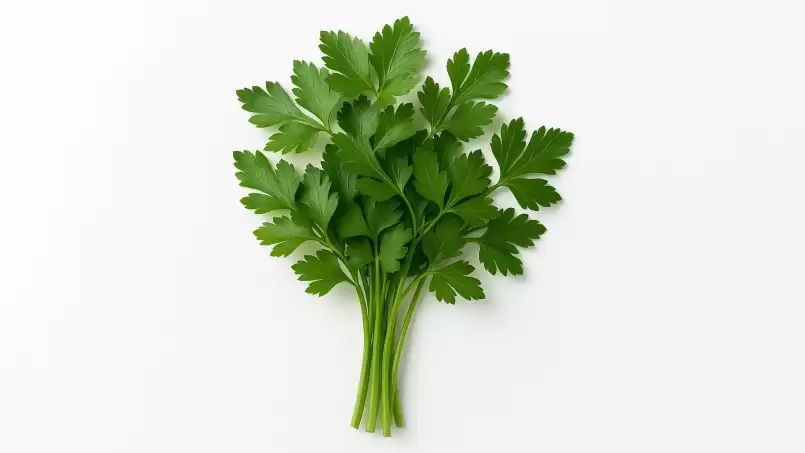Parsley
Parsley 🌿 - nature's secret to health, detox and vitality

Parsley parsley is not just a garnish, but a true natural medicine. Its leaves and root, rich in vitamins, minerals and antioxidants, make it a powerful ally for immunity, detoxification, circulation and skin health. Discover the miraculous effects, ancient cures and how parsley can improve your life.
Parsley - more than a spice
Parsley parsley (Petroselinum crispum) is a plant native to the Mediterranean area that has been used for thousands of years in both gastronomy and herbal medicine. In ancient times, the Egyptians considered it a sacred plant, and the Greeks and Romans used it as a remedy for digestive problems and infections. Today, it remains one of the most accessible and complex herbal remedies.
Nutritional composition of parsley (per 100 g)
Parsley has an impressive vitamin and mineral content, often surpassing fruits and vegetables that are considered "superfoods".
- Calories: ~36 kcal
- Protein: 3 g
- Carbohydrate: 6.3 g
- Fiber: 3.3 g
- Fat: 0.8 g (of which saturated 0.1 g)
- Vitamin C: 133 mg (more than citrus fruits!)
- Vitamin A (beta-carotene): 8424 IU
- Vitamin K: 1640 µg
- Vitamin B12: remarkable amounts, useful for blood and immunity
- Essential fatty acids: including alpha-linolenic acid
- Chlorophyll: with antifungal and antibacterial effect
- Calcium: 138 mg
- Iron: 6.2 mg
- Phosphorus: 58 mg
- Magnesium: 50 mg
- Potassium: 554 mg
- Natural fluoride: protective for teeth and bones
Benefits of parsley 🌱
- Detoxifying and diuretic: stimulates the elimination of toxins and reduces water retention.
- Fights anemia: rich in iron and vitamin C, it helps form red blood cells.
- Boosts immunity: vitamin C, chlorophyll and vitamin B12.
- Protects the liver: antioxidant and supports liver cell regeneration.
- Prevents cancer: flavonoids and myricetin fight malignant cells.
- Eye health: lutein and zeaxanthin protect the retina and prevent macular degeneration.
- Improves digestion: enzymes promote protein and fat assimilation.
- Maintains heart health: natural vasodilator, improves blood circulation.
- Balances hormones: useful in menopause, menstrual cramps and female infertility.
- Skin health: fades blemishes, nourishes and moisturizes the complexion.
- Soothe tired eyes: tea compresses reduce dark circles and inflammation.
- Anti-inflammatory and analgesic: useful in rheumatism and joint pain.
- Antiallergic: reduces allergic reactions through antioxidant effect.
Contraindications and side effects ⚠️
- Excessive consumption may cause diarrhea, gastric irritation and nervous disorders (due to apiol).
- Pregnant women should avoid parsley tea and oil - risk of uterine contractions.
- Severe kidney disease: high doses may overload the kidneys.
- Rare allergies: skin reactions may occur.
Herbal remedies with parsley 🍵
- Cystitis and urinary tract infections: tea of 2 tablespoons fresh leaves in 250 ml boiling water, 2-3 cups/day.
- Kidney stones: root decoction (20 g to 500 ml water, boiled 10 min, 2 cups/day).
- Anemia: fresh parsley juice with honey and lemon, daily.
- Liver tired: parsley juice combined with carrot and celery.
- Skin blemishes and wrinkles: mask made from parsley mashed with honey and egg yolk.
- Tired eye circles and tired eyes: parsley-infused compresses.
- Joint pain: poultices of crushed leaves applied topically.
- Bad breath: chew 2-3 raw leaves after a meal.
- Asthma and cough: infusion of seeds, traditionally used as an expectorant.
Did you know. 🤔
- 🌿 Parsley has more vitamin C than lemon or orange.
- 🍃 Chlorophyll has an antibacterial and antifungal effect.
- 💚 Vitamin B12 in parsley counteracts the effects of antibiotics and contraceptives.
- 🦷 The fluoride in parsley protects teeth against cavities.
- 🥗 Oriental tabbouleh salad has parsley as its main ingredient.
- 🫀 It helps dilate arteries and supports blood circulation.
- 🌱 The root is used as a tonic for the spleen.
- 👀 Beta-carotene protects the lungs and colon.
- 💧 It is one of the best natural diuretics.
- ⚡ Provides energy and reduces chronic fatigue.
- 🐝 Apiol, a substance with excess narcotic effects, is extracted from the seeds.
- 👩⚕️ In folk tradition, it was used for menstrual problems.
- 🔥 Said to neutralize the effects of alcohol and tobacco.
- 🌍 It is cultivated worldwide as a medicinal herb.
- 🦴 The fluoride and calcium in parsley strengthen bones and joints.
- 🧴 It is used in cosmetics to whiten and tone the complexion.
- 🐛 It helps eliminate intestinal parasites.
- 🍀 In folk beliefs, it was put on icons for good luck and health.
- 🥒 It combines excellently with cucumbers and tomatoes for detoxification.
- 👩🔬 Modern studies confirm its anti-tumor effects.
Conclusions
Parsley is a real "Romanian superfood", accessible and valuable. From fighting anemia to boosting immunity, from detoxification to skin health, it offers multiple benefits for the body. Consume it in moderation, in salads, teas or juices, and you'll discover it's more than just a spice - it's nature's green medicine.
Summary
Beneficial effects:
- detoxifying and diuretic
- antioxidant and antitumor
- anti-inflammatory and analgesic
- immunostimulant
- digestive tonic and hepatoprotective
- cardiovascular protector
- hormone and fertility regulator
Side effects:
- gastric irritation on excessive consumption
- nervous disorders (apiol)
- risk of diarrhea
- rare allergic reactions
Contraindications:
- pregnancy (tea/oil forbidden)
- severe kidney disease
- excessive daily consumption
Comments